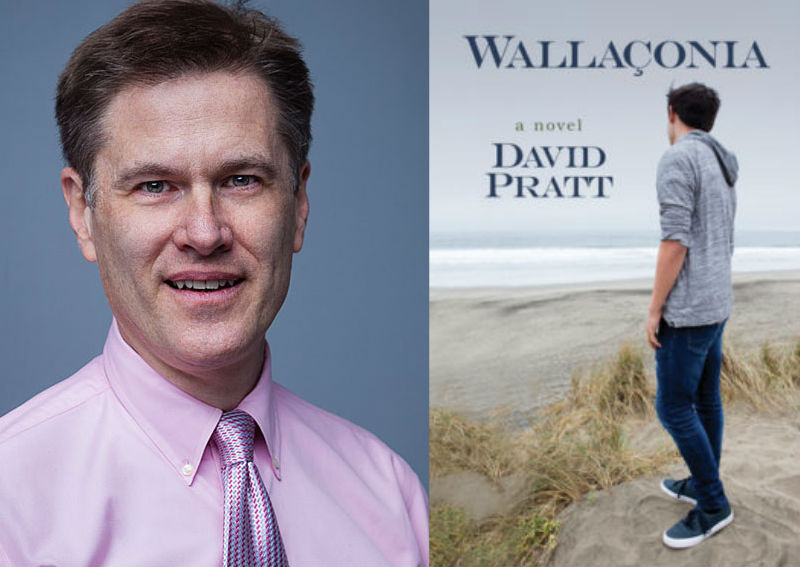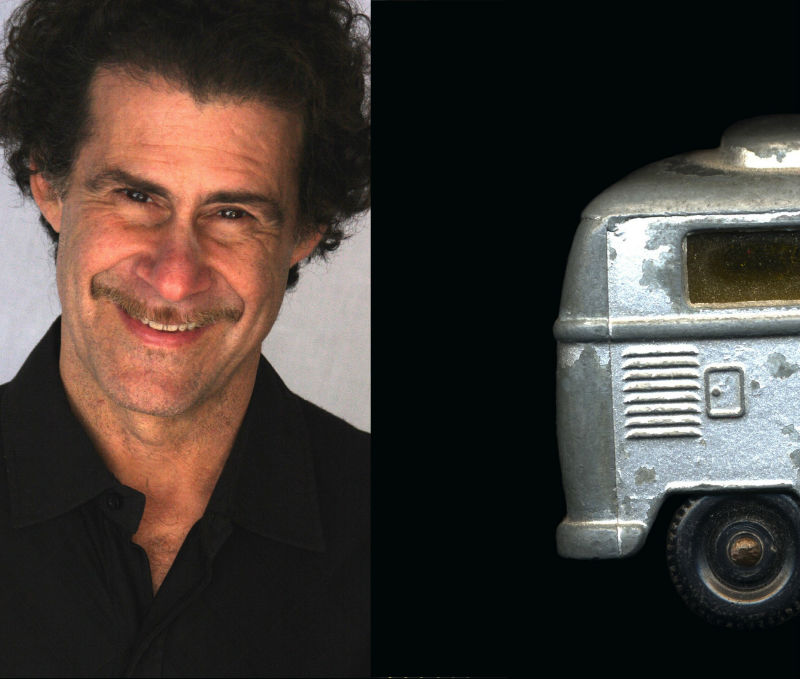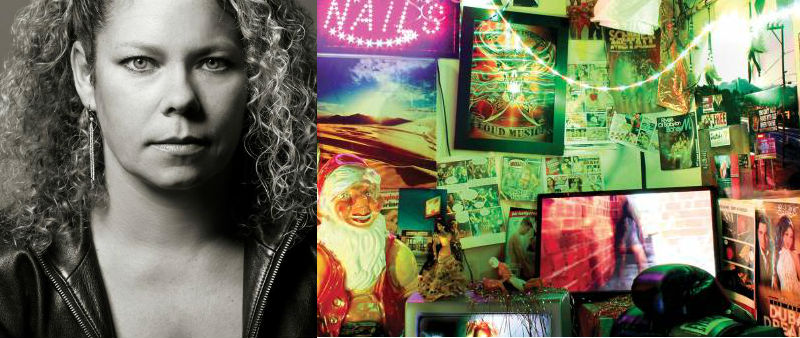A World of Music: Galeet Dardashti & Divahn at The Ark
"Well, it was only natural that a Jewish Middle Eastern band should form in Austin, right?" joked singer Galeet Dardashti when asked how she formed the band Divahn.
Though Dardashti and Divahn don't have any Texas twang in their music, the songs they create aren't hemmed in by geographical or cultural boundaries. The group blends Persian, Jewish, Arabic, and Indian music, with touches of European classical and American/Latin jazz, into a worldly blend that seeks to highlight our universal commonalities, regardless of the land under your feet.
It's music made to spark a bright light during a time filled with murky shadows.
"We chose to record our new song, 'Banu Choshesh Legaresh (We’ve Come to Chase Away the Darkness),' for our upcoming album because the lyrics really spoke to us. It’s a Hanukah song and we decided to record it right after the November election. Hanukah is all about overcoming the darkness and we were all very down and in need of some of that Hanukah light. The Hebrew lyrics are:
We’ve come to chase away the darkness
We bear light and fire
Each glimmer is small
But together, our blaze is fierce
Flee, darkness
Go away, night
Flee, before the light
The lyrics gave us hope, reminding us that we are more powerful when we resist/persist together. Our fans really loved the song and so we -- with the help of a friend -- made our first music video." (See above.)
Divahn plays The Ark on Monday, April 3, and we talked to Dardashti about her family's rich musical history, the band's hearty sonic soup, and being an all-female band performing an all-male repertoire when it tackles traditional tunes.
Gift of Character: David Pratt launches "Wallaçonia" at Common Language

We all feel isolated during adolescence. But Jim Wallace, the main character in Ann Arbor-based author David Pratt’s new book, Wallaçonia, does something about it.
Feeling alienated from his own world, Jim imagines his parents’ yard and woods as his private country -- the titular Wallaçonia. But as we all must do, Jim grows up and realizes he has to leave behind not only his secret place but certain assumptions he made about himself.
Bookseller Pat Baxter asks Jim to work at his store with him over Christmas break. Jim at first feels conflicted about working for the openly gay Baxter. But when Jim’s father makes fun of Baxter, Jim takes a stand by working for him. He feels he should stand by this man and be an ally to Baxter. Through the course of the book, Jim realizes that is more than an ally -- he is gay himself.
“The book is more about the 'how' than the 'what,'” Pratt said. “Jim has some of the same insecurities as Pat and it was important to me to have a setting where they could talk and get to know each other.”
Choro-scuro: Danilo Brito brings Brazil's soul to Kerrytown Concert House
"Heitor Villa-Lobos said that choro represents the soul of Brazilian people," said Danilo Brito, a mandolinist from São Paulo who plays this form of music that Brazil's legendary composer so beloved.
The 32-year-old Brito has been playing choro -- a high-spirited, waltz- and polka-influenced music that dominated Brazilian popular music from the late 19th century and well into the 20th -- since he was a child. At age 10, he would go to music shops that hosted choro jams and would sit in with much older players, and at 19 he won the Prêmio Visa de Música Popular Brasileira, a prestigious competition that was held in São Paulo between 1998 and 2006.
As one of the leading exponents of choro, Brito is dedicated to exploring the genre's history and expanding on its compositional template, which typically includes three sections, all in different keys. "Choro continues to be played, composed, and is a living rich genre," he said.
Brito and his band -- Carlos Moura (7-string guitar), Guilherme Girardi (6-string guitar), and Lucas Arantes (cavaquinho, a small 4-string guitar) -- will demonstrate choro's lifeforce with a show at Kerrytown Concert House on Saturday, April 1. We talked with the mandolinist about his musical background and what makes choro the heart of all Brazilian popular music.
Lullabies & "Lullaboy": Broadway star Jessica Grové sings to benefit Encore Theater

At this point in her career, actress/singer Jessica Grové -- whose Broadway credits include A Little Night Music (with Bernadette Peters and Elaine Stritch), Sunday in the Park with George, Thoroughly Modern Millie, and Les Miserables -- is ready to venture into new, more personal territory: a cabaret show titled I Have Found: A Journey Through Song with Jessica Grove, which she’ll premiere this weekend at Dexter’s Encore Theater. (Friday’s performance is concert-only, while Saturday’s is Encore’s gala fundraiser.)
“I’ve done concerts before -- like, an hour-long concert of songs -- but cabaret is a whole different art form,” said Grové. “You have to tie them together in a meaningful way, and have a climax, and have a realization and a summation. Those are writer things, and I’ve never considered myself a writer, but I’ve really enjoyed the process.”
Personal Jams: Joe Hertler & the Rainbow Seekers celebrate new LP at The Blind Pig

Most jam bands flaunting funky guitar riffs and soulful saxophone solos don’t feature lyrics featuring inward exploration and Joseph Campbell references. But Joe Hertler and the Rainbow Seekers fill this hole in your musical palate you didn’t even know you had.
Producer and bassist Kevin Pritchard heard Hertler through Bigger Brush Media’s Quilted Attic session series in Lansing, where the singer lives. From there, the project took off. Their first album, 2011's On Being, features plenty of banjo and fingerpicking, resembling Hertler’s early solo EPs. It’s obvious the group was just getting its sea legs in terms of crafting the funk-pop sound they finally settled on.
On 2014’s Terra Incognita, the outfit solidified its acoustic-rooted, electric-accented, boogie-jam focus. Standout tracks like “The Garden” and “Future Talk” talk about the necessity of living in the moment and being devoted to those you care about. For the brand new Pluto, electronica has crept into the Rainbow Seekers' sound, but Hertler’s lyricism is still evident on the singles “Lonely” and “Crimson Line."
Hertler’s lyrics come across like Henry David Thoreau meets Passion Pit with their fusing of natural influences and pop rhythm and meter. “Crimson Line” from Pluto is a masterful display of Hertler’s profound connection to the Earth and doesn’t seem like it belongs in a synth-based track. The opening lines, “As staccato mountains rise to meet their morning form / Their peaks ignited while the sun reaches on overboard,” conveyed through Hertler’s soft but funky falsetto, could make a suburbanite worship the natural Earth.
Every Rainbow Seekers show is full of flowery sets, some form of outlandish costume -- multi-colored feather capes and grandpa sweaters -- and good vibes all around. The Rainbow Seekers also like to dip into energy-filled covers, with the Ghostbusters theme sneaking its way into a setlist every now and then.
The Rainbow Seekers will play back-to-back gigs at The Blind Pig Thursday, March 30 and Friday, March 31 to celebrate the release of Pluto.
In an email interview with Pulp, Hertler spoke about his songwriting process, Pluto, and who he would like to grab lunch with.
A Mess of Best: Stef Chura at The B-Side

Stef Chura's debut studio album, Messes, is a guided trip through her metamorphosis as an artist, from bedroom folkie to budding indie-rock star. Some tracks reflect the image of Chura recording her earlier lo-fi cassettes, while others cast you into a dimly-lit house show in Ypsi. But “Slow Motion” and “Faded Heart” are tighter and more powerful than her earlier works and have the potential to shoot Chura into bigger venues, such as her recently announced spot on Detroit’s Mo Pop Music Festival lineup at the end of July.
Messes, which came out January 27 on Urinal Cake Records, is a culmination of Chura’s best songs over many years of performing and writing, which is why it sounds so diverse. The LP’s album art -- a collage of liquid makeup, sprinkles, spiderwebs, and a waffle -- is testimony to the album’s capacity to switch from “fingerpicky” (an adjective Chura chose to tag her album on her Bandcamp page, such as the Joni Mitchell-goes-electric "Human Being," to uptempo alternative jams, such as "Spotted Gold."
Her emotive, slurring vocals and introspective lyrics reflect classic poetic influences infused with '90s punk movements such as Riot Grrl. Lines like “You'll be looking at a depression in the sand / At the silhouette of an unfolded hand” from “Slow Motion” sound as if they came from the pen of Walt Whitman, while “Spotted Gold” has a lyric -- “You've been reckless for so long / You've been reckless on a marathon / But if you wanted to walk away / You can do that” -- that evokes Bikini Kill.
Chura will be performing with her drummer at The B-Side in Ann Arbor on Saturday, April 1 and will be joined by Ypsilanti’s Wraith and The Present Company.
We talked to Chura about her LP, the influence of the Ann Arbor-Ypsi music scene on the now Detroit-based artist, getting kicked out of boarding school, and more. You can also stream Messes in its entirety.
Stimulation and Possibility: Dick Siegel's "Digital Manipulations" at Kerrytown Concert House

Local award-winning singer-songwriter Dick Siegel’s return to the visual arts has been a long time in coming. But having found his chosen medium, his return is both assured and insightful.
In a recent interview at the Kerrytown Concert House, Siegel said both the visual arts and music were passions that run through his family experience. But as his personal interest was in music -- and a reasonable one at that considering his award as Best New Folk Artist at the 1991 Kerrville Folk Festival and multiple Detroit Art Awards -- it was only until the turn of the millennium when working with a computer and scanner that his visual arts creativity began to take hold.
As Siegel says in his artist statement for this exhibit, “Through digital manipulation of color, shape, and image I enter a world of enormous visual stimulation and possibility. In this realm I discover things to construct that move me, amuse me, and amaze me. I then work to bring them into physical reality with their vividness and vitality intact."
"Here and There": The voyeuristic art of Tracey Snelling

Upon entering the U-M Institute for the Humanities' gallery room that houses artist Tracey Snelling’s latest exhibition, lsa.umich.edu">Here and There, one is immersed in a life unfamiliar to some and unimaginable for others. Neon signs flash “drift” and “Lost City” to light up the darkened room while several tiny, connected rooms hang from one wall all bustling with sights and sounds to tempt the viewer to look closer and give in to their voyeuristic desires.
The rooms, each about the size of a shoe box, were completed during the Berlin, Germany- and Oakland, California-based Snelling’s recent residency at the University of Michigan’s Institute for the Humanities. While viewing the rooms from afar gives you an idea of how the entire piece moves as a whole, Snelling wants to get up close and explore the rooms. Upon closer inspection with the Bee Gee’s “Night Fever” as your soundtrack one begins to notice the details placed in each room to give them character; a shotgun leaning on a recliner, the Jack Daniels poster on a wall, High Fidelity playing on a screen in the record shop, or a pool cue leaning on a pool table in a bar.
All Dolled Up: Tappan Players’ “Hello, Dolly!"

The current political climate impacts us in ways big and small -- like factoring into the decision of whether or not to ditch the “Motherhood March” number in Tappan Players’ new production of Hello, Dolly
“We were going to cut it for time,” said the show’s co-producer Lisa Richardson. “But after the Women’s March, we decided to put it back in.”
Tappan Players is a student-run theater company that stages one big musical each year. An outgrowth of the Burns Park Players, TP is now in its 27th year, and Hello, Dolly features about 80 Tappan Middle School students in the cast, more than 30 in the crew, and 15 in the orchestra. The company was born out of a desire to give kids who age out of Burns Park Players a chance to keep learning about theater and be part of a show.
“There’s a certain amount of magic that happens,” said Richardson. “When I’ve made sure the director (Anna Martinsen) has what she needs, and the business part gets done, I spend a good chunk of time sitting in the audience during rehearsals. … And watching these kids who started out shy and unfamiliar with the process start blossoming right before your eyes -- I think of it as a magic place, where kids get to be creative and free, and no one’s judging them for it.”
Taking Comfort in Beethoven: The Takács Quartet at Rackham

“The times are a little tricky right now,” said Geraldine Walther, violist for The Takács Quartet. “In Beethoven’s day, as Napoleon’s army marched through Vienna, times were a little tricky, too. People are thirsty for something to hang on to.”
And that means there’s a real need for Beethoven’s string quartets.
“It’s very troubled music and very tragic, and somehow Beethoven makes a transformation and comes out of the darkness into the light, and we all go there with him and come out again,” said Walther.
“I feel we can center ourselves in art, and especially in this very profound music of another world,” she added. “There’s something about Beethoven. He’s able to convey what it means to be a human being in an all-embracing way everyone can identify with. And we as performers get to experience that first-hand with the audiences. It’s really been a great experience to play the quartets, and to play them now. Everywhere we’ve gone -- London or Berkley, Princeton or Ann Arbor, everyone is thirsty for this.”


































